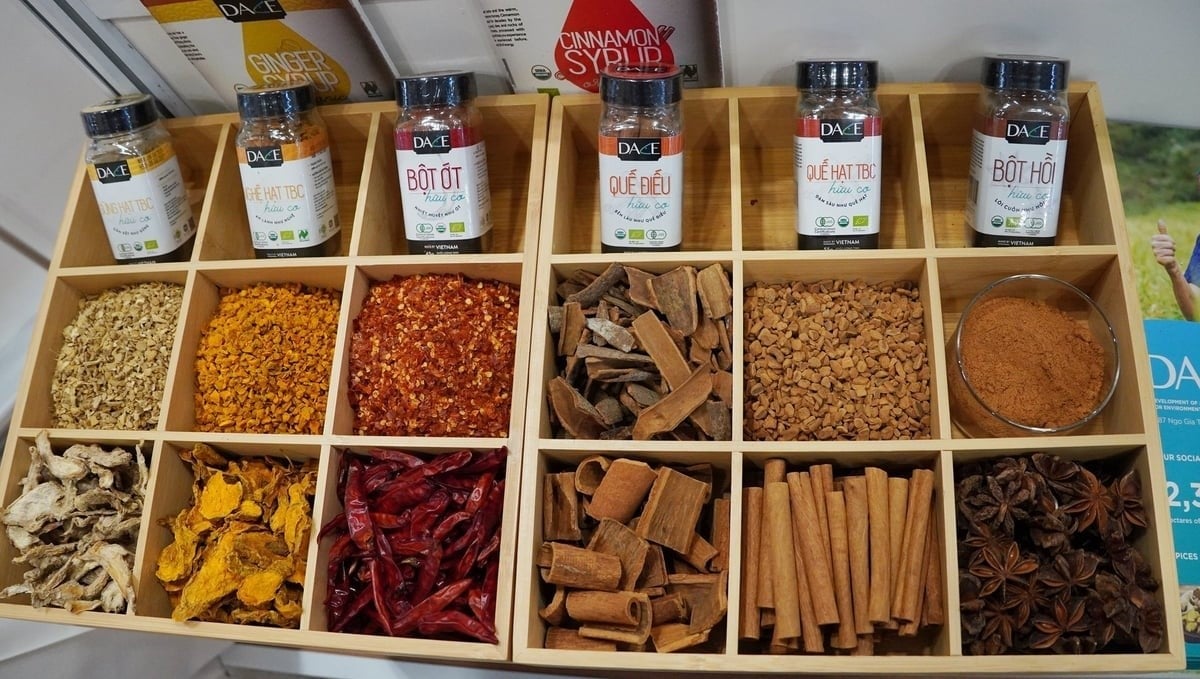November 25, 2025 | 04:28 GMT +7
November 25, 2025 | 04:28 GMT +7
Hotline: 0913.378.918
November 25, 2025 | 04:28 GMT +7
Hotline: 0913.378.918

Vietnam has strength in spice production. Photo: Nguyen Thuy.
Economic relations between Vietnam and Thailand have grown significantly, becoming a key pillar in the Comprehensive Strategic Partnership between the two nations. With the advantage of geographical proximity and interconnected infrastructure via the East-West and Southern Economic Corridors, both nations have effectively taken these advantages to promote trade, investment, and logistics cooperation.
Ms. Ho Thi Quyen, Deputy Director of the Ho Chi Minh City Investment and Trade Promotion Center (ITPC), said that in the first quarter of 2025, bilateral trade turnover reached USD 5.17 billion, an increase of 8.36% compared to the same period last year. The two countries have set a goal of raising bilateral turnover to USD 25 billion by 2025, with a focus on balanced trade and sustainable development.
To support enterprises in trade promotion, since 2016, the Ministry of Industry and Trade, in collaboration with ITPC and Central Retail Vietnam, has organized the annual "Vietnamese Goods Week in Thailand" program. This program has helped nearly 500 Vietnamese enterprises gain access to Thai consumers through Central Group's distribution system. Notably, in 2024, the event was held for the first time in Udon Thani province, where a large community of overseas Vietnamese resides. Thereby promoting consumption of products such as agricultural products, processed foods, tea, coffee, handicrafts, and household items.
Ms. Nguyen Thi Bich Van, Communications Director at Central Retail Vietnam, noted that while the Thai market holds great potential, it also imposes strict requirements on product quality, labeling, packaging, and food safety standards. Vietnamese enterprises should strengthen their competitiveness to better meet consumer demand in this market. Ms. Bich Van also stated that the Group is promoting the import of Vietnamese lychee into Thailand right at harvest time. This presents a big opportunity for Vietnamese fresh fruits to deeply penetrate into this market, provided they meet criteria for traceability, plant quarantine, and standardized packaging.
Given Thailand's increasingly high requirements, Vietnamese enterprises can no longer rely on traditional approaches. Instead, they must invest methodically in market research, product quality improvement, packaging standardization, and effective marketing strategies.
Enterprises' proactiveness and rapid adaptability will be decisive factors in helping Vietnamese goods not only overcome technical barriers but also establish a strong foothold in Thailand, one of Vietnam's key export markets in the ASEAN region.
Expanding agricultural exports to Thailand not only delivers economic value but also contributes to promoting green, sustainable agricultural production, in line with the strategic growth orientation of both countries that integrates environmental protection and enhances the value of Vietnamese agricultural products in the international market.
According to Mr. Do Thanh Phuong, Director of P&K Development Co., Ltd., currently, Thai consumers are increasingly prioritizing natural and health-friendly products, especially in the context of the ongoing complex developments of the pandemic. As an agricultural producer, Mr. Phuong expressed a wish to connect with Thai partners, particularly in collaboration related to agricultural products, fruits, medicinal herbs, and private-label manufacturing.
Mr. Chailermchai Pornsiripiyakool, Vice President of International Relations and Sustainable Development at Central Retail Vietnam, affirmed that products meeting international standards and demonstrating environmental friendliness will be prioritized for distribution through the Central retail system in Thailand. Among Vietnamese items with high potential in this market are seafood, sweet potatoes, dragon fruit, coffee, sauces, and spices.
Therefore, in addition to improving product quality, Vietnamese enterprises must also prepare complete legal documentation such as food import licenses issued by Thailand's FDA, food safety certificates, ingredient lists, certificates of analysis (COA), packaging images, and Thai-language labels (affixed at warehouses, factories, or through logistics companies).
Translated by Thu Huyen

(VAN) An Giang promotes supply-demand connections, standardizes quality and builds value chains, creating a foundation for sustainable bird’s nest development and aiming to expand exports.
/2025/11/24/5339-4-nongnghiep-075331.jpg)
(VAN) Recently, the conference on 'Sustainable Fisheries Linkage Chain - Tilapia for Export' took place in Tien Hai commune, Hung Yen province.
/2025/11/21/4309-2-153400_128.jpg)
(VAN) Green and low-emission rice is paving the way for Vietnamese rice to enter high-end markets, marking the beginning of a transformation journey toward greening and elevating the national rice brand.

(VAN) ‘Right to Win’ outlines a national action plan that shapes a new vision for Viet Nam’s agriculture in an era of renewal and global integration.

(VAN) Lam Dong’s farmed sturgeon output this year is expected to reach 2,300 tons, worth VND 450 billion, affirming the brand’s position on the market.

(VAN) A surge in Ukrainian egg exports, largely driven by soaring sales to the UK over the last few years, has notably pushed up egg prices on the domestic market.

(VAN) The price of Arabica Catimor coffee in Quang Tri is currently at VND 25,000–27,000/kg (fresh cherries), the highest level ever recorded